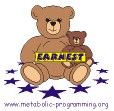|
RESEARCH PROGRAMME
Why was this project carried out?
Early nutrition programming is the concept that
differences in nutritional experience at critical periods in early life, both
pre- and post-natally, can programme a person's development, metabolism and
health for
the future. This has been well-established in animal studies and there is
a large amount of data from retrospective observational studies in people that
suggest that a similar effect is seen in humans.
There is less data available from contemporary
prospective studies and randomised controlled trials because these studies have
not been running for long enough. The Early Nutrition Programming Project
enabled the participants of
these studies to be followed up into early adulthood in order to see whether the
differences seen in childhood persist into adulthood.
The implications of early nutrition programming
are huge - differences in risk factors for cardiovascular disease, diabetes and
obesity, in immune function and allergy risk, in bone health, and in cognitive,
neuro-motor and behavioural outcomes have all been seen in children. The
potential for improving the health of future generations is enormous.
This project also addressed other areas
where not enough is known about early nutrition programming to enable sensible
policies to be formulated. It gave an insight into when the critical
periods are, how the effects are mediated and whether or not they can be
reversed.
What were the project's key objectives?
- Quantification of the effects of early
programming on later cardiovascular diseases, obesity, diabetes, cognitive and
mental disorders, bone health and some cancers (Themes 1-3).
- Definition of the relative importance of critical
periods in foetal and early life on later disease (Themes 1-3).
- Exploration of the impact of genetic determinants
on early programming effects and on subsequent outcome (Theme 3).

- Understanding the role of specific nutrients and
their interactions in the maternal and infant diet on programming effects on
disease and their risk factors (Themes 1-3).
- Understanding mechanisms for early programming on
later disease and their risk factors (Theme 3).
- Development of appropriate strategies for
treating and especially for preventing the amplification of adverse programming
effects of early nutrition (Theme 1).
- Exploration of the public health impact of how
knowledge about early programming affects consumer behaviour (Theme 4).
- Quantification of the impact of early nutrition
on the economic burden of adult ill-health (Theme 5).
- Demonstration
projects to test the viability of new technologies that offer a
potential economic advantage, but which cannot be commercialised
directly (Theme 6)
- Improvement of training and enhancement of
training opportunities for all including accession countries (Theme 8).
What did
the project contribute?
Achievements
- The best available data from trials and
prospective studies in humans
- State of the art laboratory studies of
mechanisms and critical time periods
- Classification of the key genes regulating
metabolic processes related to programming
- Information on the social and economic costs
of programming in Europe
Applications
- Evidence to guide improvements in the
nutritional value of formula milks
- Data to help formulate policies on
composition and testing of infant foods
- Interventions proven to prevent and reverse
early nutritional programming
- The potential to develop new products
through industrial partnership
Spin-off benefits
- Creation of a virtual "Institute of Early
Nutrition Programming"
- A new generation of internationally
respected multi-disciplinary scientists
- Maximal impetus to maintain Europe's lead in
this critical area of research.
back to top
| 

